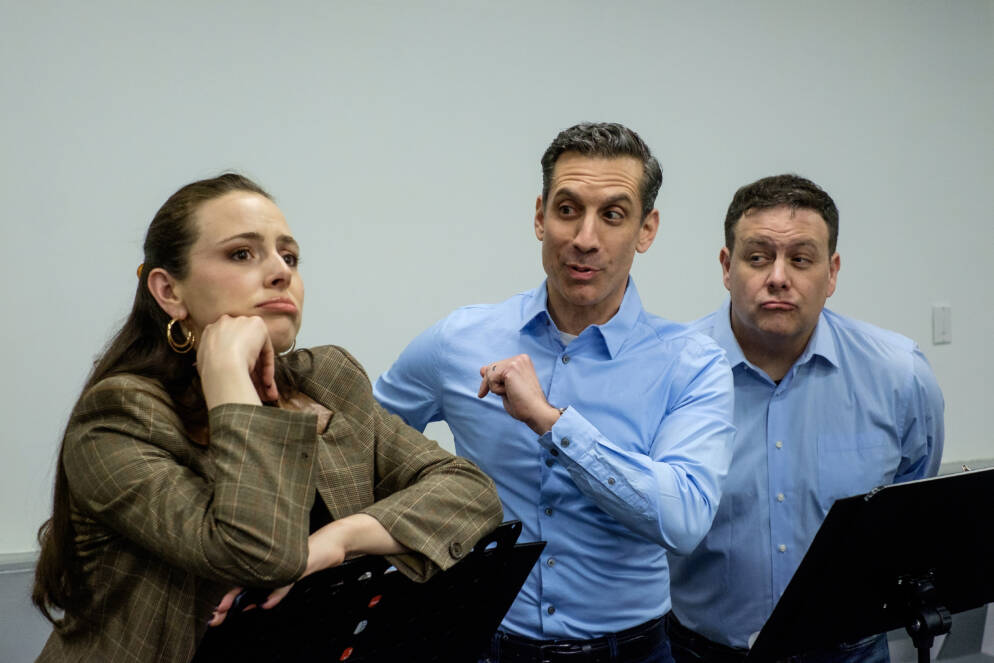 A Theatre Ariel performance from the 2024-25 season. (Photo by Aaron Oster)
A Theatre Ariel performance from the 2024-25 season. (Photo by Aaron Oster)
Theatre Ariel, Philadelphia’s professional theater company that is dedicated to telling stories about the Jewish experience, is starting its 2025–2026 season bigger and better than before. With its first-ever fringe show and burlesque, the theater company has big plans for the upcoming season for its growing audience.
The season will kick off with performances at the Philadelphia Cannonball Festival, the first and largest fringe show festival in the area.
“This season actually has a bunch of firsts,” said Jesse Bernstein, director of Theatre Ariel. “We’re kicking off the season with our first fringe show, which will be presented as part of Cannonball Fest, and we’re also doing our first burlesque show.”
The company’s burlesque show at Cannonball Fest will feature Eric Jaffe, a local Jewish drag queen, in “Gazelles and Garters.” Inspired by “Song of Songs” from the Bible, there will be three performances and a reading of excerpts from the poem.
“We’re reclaiming the lyricisms and the sensuality of scripture,” Bernstein explained.
Theatre Ariel has been growing its audiences with its main stage performance last year of “Amsterdam,” filling 95% of a 99-seat house, according to Bernstein.
This year’s main stage, called “Marsh Blovotnick and the Marvelous Magical Chicken Soup,” is currently being written by Dan Kitrosser, a playwright who lives in South Philadelphia, and will debut in March of next year.
“[‘Marsh Blovotnick and the Marvelous Magical Chicken Soup’] is a fun comedy,” said Bernstein. “I think people are really going to enjoy it. It’s very smart. [Kitrosser] is very clever and witty.”
Also new this season, the theater company will partner with the Weitzman National Museum of American Jewish History to bring performers from New York City to perform a show called “The Essence: A Yiddish Theatre Dim-Sum” in December.
“[‘The Essence: A Yiddish Theatre Dim-Sum’] is a fast-forward through all kinds of Yiddish theater in Yiddish,” explained Bernstein. “They advertise it for people who love Yiddish and for people who couldn’t care less about Yiddish.”
Bernstein said that the theater company is trying to “cast a wide net” this year with the types of performances it is putting on.
“We really believe that there’s lots of people who are looking for Jewish culture, who are looking for places where they can feel and celebrate their Judaism, but not necessarily be locked into one version of that,” said Bernstein. “We’re hoping that this smorgasbord of a season that we are offering will appeal to lots of different people.”
Bernstein said that he hopes the performance can bring together Jewish people from across the different Jewish communities.
The theater company’s main mode of performance is its salon shows, inspired by European salons when writers would get together in the “salon,” or living room, of the home and read their work.
“We used to actually do them in people’s living rooms pre-pandemic,” Bernstein said.
“We’re now doing them all in public venues, but we work really hard to maintain that intimacy.”
This season’s first salon is called “The Accomplices,” based on the true story of a young activist who goes to Washington, D.C., in the 1940s to try to convince Franklin Delano Roosevelt to save the Jews in Europe from the Holocaust.
Bernstein said that he is still in the process of getting the rights for the show, but it is one that should be familiar to audiences.
One of the ways Theatre Ariel maintains the intimate feel of its shows is by hosting a post-show discussion where the audience and cast members discuss the themes.
“[The post-show discussion] is the most exciting part of the evening because that’s where we really get into the themes of the play and people will share experiences,” said Bernstein.
“For a lot of people, it takes the experience of the show to another level because they get to embrace this community around them and share ideas with one another and ask questions of one another and answer one another, all of it inspired by the play.”
Bernstein added that the performances are especially important during a time of rising antisemitism.
“I think our shows can be a great place for people to come and spend time with friends, with family and with strangers and get reinvigorated in these dark times and reconnect with community and with their own Jewish, human selves,” said Bernstein.